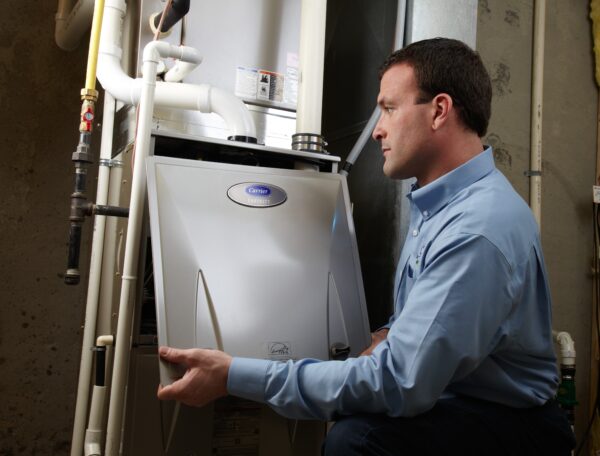
Although not as common as gas furnaces, oil furnaces can still be a great option for heating your home. The only issue with oil furnaces is that you will need to know approximately how much oil the furnace uses in a day so that you know when you need to have your tank refilled. If not, then you will always run the risk of running out of oil and having to go without heat until you can get the tank refilled. Let’s explore how to estimate how much oil your furnace uses and also look at the different factors that can influence this.
Factors That Affect a Furnace’s Oil Consumption
The two main factors that will influence how much oil a furnace uses are the size of the unit and its energy efficiency. The age of the unit is also important as older units are generally not nearly as efficient and will often have some issues that decrease their effectiveness or otherwise cause them to use more oil.
Where you live is obviously another important factor as your furnace will always run longer and thus burn more oil the colder the outdoor temperature is. The level of insulation and how well sealed the home’s envelope or exterior structure is also play an important role in how often the furnace runs due to potential heat loss.
How to Know How Many Gallons of Oil a Furnace Uses Per Hour
The first thing you’ll need to do to estimate how much oil your furnace uses in an average day is to find out how many gallons of oil it burns per hour. Your furnace should have a manufacturer’s plate that contains all of the relevant info about the unit, including how many gallons it uses per hour. If possible, you can also look at the unit’s burner nozzle as this should also show gallons per hour.
The typical oil furnace will use somewhere between 0.5 and 1.8 gallons of oil per hour. However, it is important to note that these numbers are based on if the furnace ran continuously for an entire hour, which should never happen if the furnace is working properly. This means that the gallons per hour on its own isn’t enough to estimate total oil consumption since you also need to find out approximately how many total hours the unit runs for in an average day.
Estimating How Many Hours Your Furnace Runs in a Day
The best way to estimate the total number of hours your furnace runs in a day is to observe it for an hour during the afternoon when the weather is hottest and then again for an hour at 5 or 6 a.m. when the outdoor temperature is coldest. This should always be done in the middle of winter on a day when the highs and lows are near average. It is also important to make both observations on the same day, or else your calculations won’t be that accurate.
You don’t actually need to sit in front of the furnace the entire time. Instead, you can just listen and make note of when it turns on and off throughout the hour. This will give you a rough idea of how many minutes the unit runs for in an hour in both warmer and colder temperatures.
Once you know how many minutes the furnace runs for in an hour during the warmest and coldest parts of the day, you can then use these numbers to estimate how many gallons of oil it burns in a day. To do this, you will first need to add up your two observations and then divide by two to find the average minutes the furnace runs per hour. You can then multiply this number by 24 to calculate how many minutes it would run over the course of an entire day. Finally, you will then need to divide this number by 60 to calculate the total hours the unit runs on an average day.
Let’s say that the furnace ran for 20 minutes total when you observed it in the afternoon and 35 minutes during the coldest part of the day. Adding these numbers up and then dividing them by two gives you an average of 27.5 minutes per hour or 660 minutes in a day. Divided by 60, this gives you a total average of 11 hours per day.
These observations are important for estimating how many gallons of oil your furnace uses in a day, but they can also help you to determine if your furnace has any issues. When working correctly, your furnace should normally only ever run twice an hour during the warmer parts of the day. If your furnace runs almost continuously or frequently turns on and off, it is a good sign that there is some issue that is negatively impacting its performance. In this case, you should have it inspected as soon as possible to ensure it isn’t wasting energy.
Calculating Total Daily and Monthly Oil Usage
Now that you know how many hours the furnace runs in total on a normal day, you can then estimate how many gallons of oil it burns in a day. This is done by taking the total daily hours and multiplying it by however many gallons the unit uses in an hour. If your furnace runs for 11 hours a day and it burns 0.8 gallons per hour, then it uses an average of 8.8 gallons a day in the middle of the winter. This means that your furnace would typically use just over 246 gallons of oil every four weeks.
How to Know How Often You Need Your Oil Tank Refilled
It is important to note that your furnace will generally always use much less oil during the late fall and early spring when the temperatures aren’t nearly as cold. If you were to leave your heating system on from October to March, your daily oil consumption may average out to only 3 or 4 gallons per day. Nonetheless, the above calculations are still important for determining how often you need to have your tank refilled to ensure that you never risk running out of oil in the middle of the winter.
If you have a 275-gallon oil tank and you typically use 8.8 gallons of oil on a normal winter day, a full tank of oil would normally last you just over 31 days. This means you would typically want to have your tank refilled at least every three weeks. If you wait too long, you always risk running out if a cold snap hits and causes your furnace to suddenly use much more oil.
One of the biggest keys to ensuring that your furnace is working efficiently and not burning more oil than it should be is to have it inspected and maintained every year. At Apex Plumbing, Heating, and Air Pros, we specialize in furnace maintenance and repairs, and we work on both oil and gas units. If you need to have your old furnace replaced, our technicians also specialize in furnace installation. Our team also includes licensed plumbers that specialize in drain cleaning, sewer repairs, and a full range of other plumbing installation and repair services. We offer a 5-star satisfaction guarantee. Give us a call today if you have any questions or need to schedule any HVAC or plumbing service in the Columbus area.





